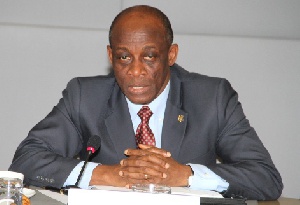 Finance Minister, Seth Terkper
Finance Minister, Seth Terkper
Despite announcing last month that the economy is on course to meet targets set for the first review of the IMF programme, Finance Minister Seth Terkper has been urged by a London-based investment advisory firm to marshal his forces as the greatest threat to the success of the Fund’s programme is yet to come.
According to the firm, which is headquartered in the United Kingdom, moves to increase revenues by widening the tax base and improving on efficiencies in collection are unlikely to yield any significant short-term impacts due to weak structures -- such as inefficient public and business address systems.
Based on the agreed programme with the Washington-based lender, Mr. Terkper is to execute a high fiscal discipline regime that will be spearheaded by a drastic cut in expenditure and also a marked rise in government’s revenues. The Africa Economics, LLC., in its publication “Ghana: Economic Policy & 2015 Outlook Report” published last month, said ahead of next year’s election it is more likely that the government will, at best, maintain current spending levels envisaged within the 2015 budget.
But the firm said the country faces stark choices with the IMF programme juxtaposed against its high stakes political environment and impending elections in December 2016; and as such, making drastic cut backs in public sector expenditure -- especially public sector wages -- will difficult for government as the elections draw near, making it more than likely these cuts will delayed until after the elections.
Under the IMF programme, the budget deficit is expected to decline from a colossal 11.6 percent of GDP in 2012 to about 3.7 percent of GDP in 2017. The Finance Minister last month in his presentation of the economy’s outlook said faster reduction of the budget deficit will be boosted by commercial oil production in the TEN field, as well as other ancillary projects in the oil and gas sector.
Nevertheless,the firm noted that volatility in commodity prices will continue to play a major role in the outlook for the country’s weak macroeconomic conditions. Africa Economics, LLC.cited government’s revision of revenue projections for 2015 and amended its budget forecast to capture the volatility in oil markets.
The total petroleum receipts for this year was revised downward by about 65 percent on account of lower crude oil prices at an estimated GH¢1.5billion (1.1 percent of GDP), compared with the 2015 budget estimate of GH¢4.2billion (3.1 percent of GDP).
Apart from oil the local economy is heavily dependent on cocoa and gold, which together account for 75% of its exports. With the price of all three key exports seeing a poor performance on the world market compared to 2013 price levels, the firm fears this state of affairs could easily worsen the country’s trade balance for 2015.
The report points out that as a result of such price volatilities, government is very likely to struggle with persistent current account deficits and balance of payment challenges for the remainder of 2015.
Already, the country’s forex reserves have also been heavily depleted due to a fall in commodity exports -- falling from US$5.89bn in November 2014 to US$5.46bn in December 2014, representing about 7.9 percent decline within the said period.
Revenue boost The firm however added that government could bolster its finances through prudent fiscal housekeeping and accountability in public expenditure. It further predicted that fiscal consolidation measures will drastically dampen non-oil economic growth initially from 2015-16, but this is forecast to rebound in subsequent years.
The IMF estimates non-oil GDP growth to decelerate further to 2.3 percent of GDP in 2015 before picking up in the following years, reaching 5.5 percent of GDP by 2017.
The IMF programme aims is to restore macroeconomic stability and debt sustainability in order to safeguard growth and employment while protecting social spending. Government has so far received a US$114.8million disbursement, expected to provide it with much-needed balance of payment support.